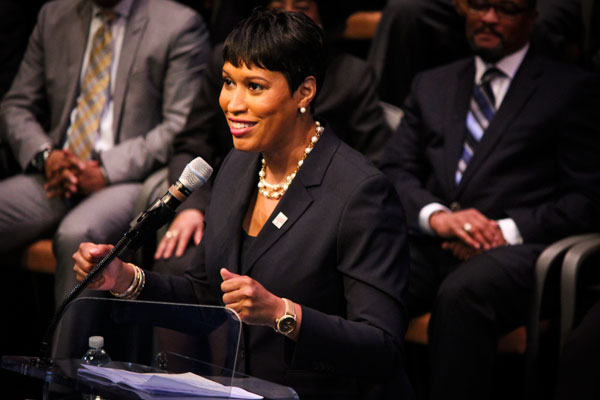The District’s official statehood organization released a draft of a constitution last week in the latest push for D.C. statehood.
The New Columbia Statehood Commission, which includes Mayor Muriel Bowser and four other local officials, released a revised version of the District’s constitution that outlines its transition to a state. The constitution is the first step in putting a D.C. statehood referendum on the ballot for citizens to vote on in November, statehood advocates said.
Bowser said at a press conference announcing the new draft last week that D.C. residents’ lack of voting rights is “unfinished business” in the U.S.
“We are not fully free here in the District of Columbia,” she said.
D.C. statehood advocates first created a state constitution in 1982, and the new draft is the first time anyone has revised it since 1987. The constitution draft contains eight articles, explaining how each branch of government would run, how officials would handle the budget and how officials could make amendments.
The current mayor would become the state’s governor and members of the D.C. Council would become delegates in the state’s House of Delegates. D.C. would also gain voting representation in U.S. Congress with one representative and two senators, according to the constitution draft.
Under current rules, D.C.’s non-voting member of Congress, Eleanor Holmes Norton, can draft legislation but cannot vote.
D.C. would also get a new name, New Columbia, according to the draft constitution.
Paul Strauss, one of D.C.’s shadow senators and a member of the commission, said members of the New Statehood Commission will visit every ward in D.C. in the first week of June to get citizens’ input on the draft. D.C.’s two shadow senators do not sit in a legislative body but attend statehood events.
He said the commission will accept comments through email, phone calls and on its website.
“We will be taking advantage of all of the technology in order to engage the public as much as possible in this process,” Strauss said.
After the public review period, the commission will present the final constitution to the D.C. Council on June 8. If the D.C. Council approves the constitution, a referendum will be added to the November ballot for D.C. citizens to vote to petition the new U.S. president and Congress.
Members of the commission traveled to the Iowa caucus earlier this year to call for D.C. statehood. At the caucuses, seven counties in the state passed resolutions supporting D.C. statehood.
Community members said during the unveiling that 13 state delegates proposed in the plan were not enough to represent the entire city. They said Vermont and Wyoming both have smaller populations than the District but have larger state legislatures – 180 members and 90 members, respectively.
Support for D.C. statehood is at an all-time high, according to a poll by The Washington Post. Nearly 75 percent of District residents are upset that D.C. does not have voting representation in Congress, according to the the poll.
Franklin Garcia, one of D.C.’s shadow representatives, said during this push for statehood, residents need to “inject new energy” into the campaign.
“Currently, we have the most pro-statehood representation in government in recent history.” Garcia said.
Garcia said that the current Democratic presidential candidates, former Secretary of State Hillary Clinton and Sen. Bernie Sanders, I–Vt., both support D.C. statehood. Republican presidential candidate Donald Trump has gone back and forth on his opinion of statehood, which could cause a problem for the bill if he is elected president, Garcia said.
“This is something people in D.C. really care about, and the candidates really care about,” Garcia said. “This is a very exciting time.”








